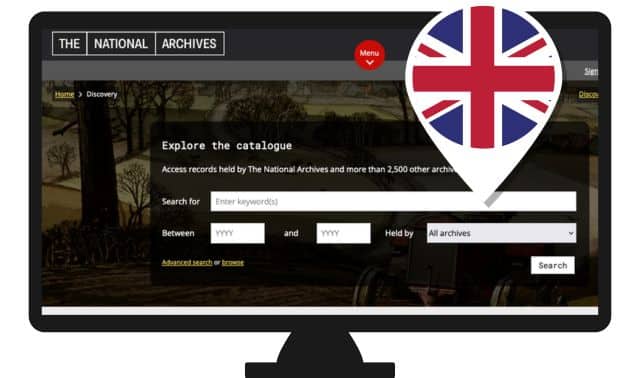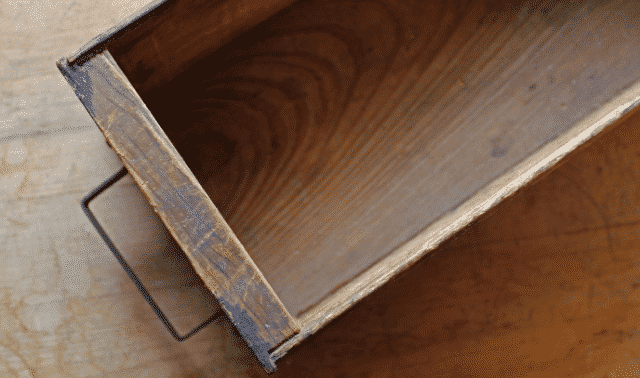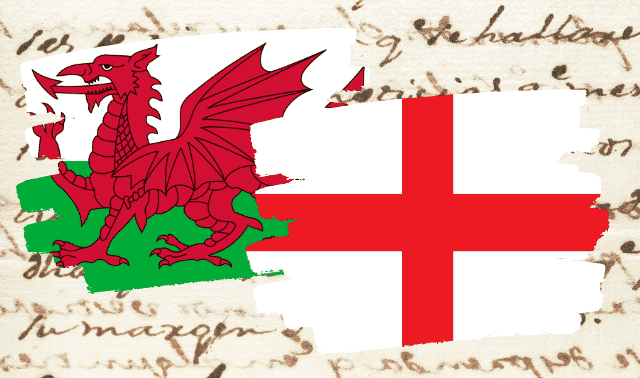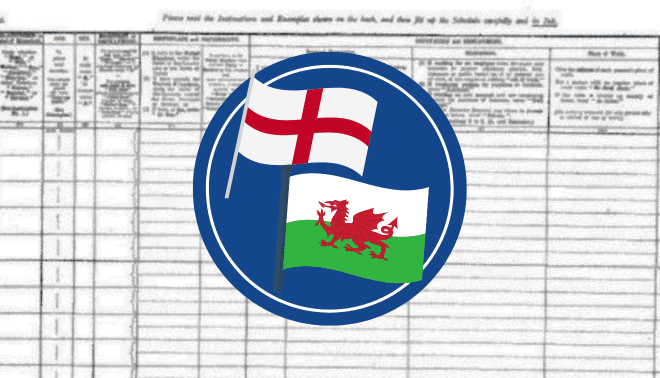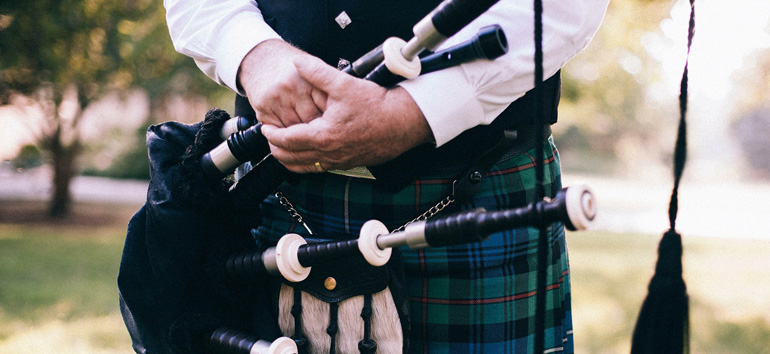Sign up for the Family Tree Newsletter Plus, you’ll receive our 10 Essential Genealogy Research Forms PDF as a special thank you!
Get Your Free Genealogy Forms
"*" indicates required fields

Researching your British ancestors has its challenges, but thanks to helpful new websites and other online resources, discovering your family history in England and Wales has never been easier.
Digitized church records, censuses and wills are going online all the time. These days, you can order a birth or death certificate online and download it instead of waiting for it to come in the mail. Now that newspapers dating back to the 1600s are online, you can search for a name and find it anywhere in millions of pages, instantly. You even can pinpoint your ancestor’s farm on a historical map and perhaps find a detailed description of the farmhouse.
All these resources for British genealogy are at your fingertips, if you just know where to look. We’ve picked 29 key websites with digitized records, indexes, how-to guides, maps and more. They’re all potential brick wall-busters, and many are free. Must-visit “megasites” with a broad variety of resources are listed first, followed by websites listed by record type. A $ indicates that access to a significant portion of the site’s features and historical records of the site requires a payment.
These large genealogy sites have extensive collections of English and Welsh records, including civil registration indexes, census records and church records. If you don’t subscribe, you have two other options for access: See if your public library subscribes to library editions of Ancestry, Findmypast or MyHeritage. Or find a Family History Center near you for free access to these library editions, plus The Genealogist.
British Genealogy Megasites
Ancestry $
A global search from the home page covers most resources on the site, but it’s well worth checking individual collections, some of which aren’t indexed. Click on Search > All Collections, scroll down to Explore by Location, and England, Scotland or Wales from the map. Be sure to browse what’s available for individual counties. Notable collections include an index to wills and administrations in England and Wales from 1858 to 1966, British phone books from 1880 to 1984, incoming passenger lists from 1878 to 1960 and outward passenger lists from 1890 to 1960.
FamilyRelatives.com $
Some of the largest record collections on this British site include 5 million parish records of baptisms, marriages and burials dating from 1538 to 1900 and probate registers from many counties of England and Wales.
FamilySearch
Click on Search > Records to search all the indexed records. On the same page, click on Browse All Collections and select United Kingdom and Ireland under Place to explore individual collections. If it says Browse Images, the collection is not indexed. Click on Search > Catalog to find more records, including many that are online. For example, search on the place England, Norfolk, and click on the Probate Records subject heading. Then, for instance, click on Wills and administrations, 1459–1857, to browse records from the Archdeaconry of Norfolk. They’re indexed in the Norfolk Record Office’s online catalog.
Findmypast.com $
This British-based site is positioning itself as the source for British genealogy, launching a British and Irish Roots collection and related subscription packages. Key records include newspapers from the British Library and the National Burial Index for England & Wales with more than 12 million burial records, mostly from 1813 to 1850. To find record collections for a particular county, click on Search > All Record Sets, select a country such as England or Wales and search on a county name. For example, select England and search on Norfolk. Matches will include several collections of Norfolk baptisms, marriages and burials.
The Genealogist $
Notable collections on this British-based site include tithe records of landowners and residents from 1837 to the early 1850s, WWI casualty lists and memorials, and Nonconformist records of Quakers, Baptists and other faiths. SmartSearch technology lets you jump between related records. For example, the site links marriage records to the couple’s children and census and death records to birth records.
Genes Reunited $
Owned by the same parent company as Findmypast, Genes Reunited also has parish records, census records, civil registration indexes and other historical records. You can build your family tree for free. User-contributed family trees with strong coverage of British families are the big draw on Genes Reunited. Unfortunately, however, all the trees are essentially private. You can search only an index of names in the family trees and you have to contact a tree’s owner for details.
MyHeritage $
In addition to civil registration indexes and census records, MyHeritage has many English and Welsh parish records licensed from FamilySearch. To find record collections from England and Wales, select Collection Catalog under the Research tab. Scroll down to Refine by Location on the left. Select Europe, then Refine Further and select United Kingdom. If you like, click Refine Further to narrow collections to England, Isle of Man or Wales. User-contributed family trees from around the world have many ties to Great Britain.
Libraries and Archives
National libraries and archives for England and Wales have published key historical record collections online. Their catalogs can also help you locate digitized or offline books and manuscripts.
The National Library of Wales
The main catalog indexes many individual records, including marriage licenses from 1616 to 1837 and wills and administrations proved in Wales between 1521 and 1858. Try searching on a person’s name and parish of residence. You can refine the results by collection, such as marriage bonds or wills, and by a range of years. My ancestor Thomas Morgan lived in the parish of Llanigon, Breconshire. The first match in a search on Thomas Morgan Llanigon is an 1819 bond granting administration of his estate to his widow Mary and bearing the signatures of two of his children. You can use a screen capture to save record images or download files for a small fee.
Under the Discover & Learn menu and the NLW Resources section, click NLW Resources to search additional genealogical collections. Foremost among these are 1.1 million pages of Welsh newspapers published between 1804 and 1919. You also won’t want to miss the Welsh tithe maps (called Places of Wales), the Dictionary of Welsh Biography, collections about both World Wars and the Crime and Punishment database, with files from the Court of Great Sessions in Wales from 1730 to 1830.
The UK National Archives
Access more than 300 guides to wills, census records and other resources on this site by clicking on Help with Your Research > Family History. Another click—Search the Catalogue—will let you explore more than 32 million descriptions of records at The National Archives and more than 2,500 archives across the country. Some records have been digitized, too. From the home page, click Find Online Collections to access more guides. A helpful feature of this catalog is that the entries direct you to digitized records on other websites, such as Findmypast.com and Ancestry.
Birth, Marriage and Death Records
Churches were the first organizations in Britain to record births, marriages and deaths. In 1538, Henry VIII issued an order to every parish priest in England and Wales to start keeping records of christenings, marriages and burials. The government began recording vital events later, when civil registration began in 1837.
Church christening records provide the infant’s name and date of christening, but not usually the date of birth. They may also include the father’s name and occupation, the mother’s first name, the child’s legitimacy and the family’s place of residence. Marriage entries in early parish registers usually provide only the date and the spouses’ names. But after March 25, 1754, they also include the spouses’ parishes of residence, marital status, groom’s occupation and whether the marriage was by banns or license. Pre-1813 burial records give the deceased person’s name and date of burial, and sometimes other details. Starting in 1813, records give the name, age, residence and date of burial.
In 1598 and later, parishes sent copies of their registers each year to the bishop of the diocese. Called bishop’s transcripts, these were supposed to be exact copies, but might contain differences or omit years.
All the genealogy megasites have English and Welsh church records, usually organized into record collections covering all of England or Wales or individual counties. (Many church records on Ancestry and MyHeritage were licensed from FamilySearch.) These major sites also have indexes to civil registration records, which indicate the district where an event occurred, but not the exact place. A registration district may cover part of a city or several rural villages. See here for information about registration districts.
DustyDocs
This site has links to free websites with church parish registers from the United Kingdom and Ireland. For example, a search on England, Norfolk County, and the parish of Upwell produces links to several sites, including an index to baptisms, marriages and burials on the FreeReg website.
FreeBMD
A free-to-search volunteer project to transcribe the English and Welsh civil registration indexes, FreeBMD covers more than 290 million records. All years are not yet available, but more transcriptions are added regularly.
FreeReg
This terrific site provides free access to transcribed church baptism, marriage and burial records from parish registers, Nonconformist records and more. Operated by volunteers and regularly updated, FreeReg has more than 58 million records and should be one of the first websites you check for UK ancestors before 1837.
General Register Office
Order birth, marriage and death civil registration certificates online for mail delivery for about $12, including postage. You can also order a birth or death certificate as a PDF download for about $8.
The Joiner Marriage Index $
You can search transcriptions of over 3.2 million marriage records from English and Welsh church parish registers before 1837, many of which are not indexed anywhere else.
Genealogy Guides
These free online guides to genealogy in England and Wales can help you become more familiar with the records and repositories of the British Isles. Bookmark these site to consult whenever your research takes a new turn:
Discovering English Ancestors
This excellent guide to English genealogy from Brigham Young University suggests search strategies and describes key records with links to related websites. Many of the books mentioned are available online. Find digitized versions in the FamilySearch Catalog by searching the online library catalog WorldCat or by entering the title in your web browser.
FamilySearch Research Wiki
Made up of articles contributed by the public, the Research Wiki has especially useful guides to family history research in England and Wales. Start by searching on England or Wales. Explore the links to online records, lessons, guides to key records and research in specific counties. Each county page has a research guide, plus links to a page for each parish within the county. For example, the page for Wiggenhall St. Mary Magdalen, Norfolk Genealogy describes the major resources for that parish and it has links to indexes and images of online parish records.
GENUKI
This website provides extensive information on genealogy resources for the United Kingdom and Ireland. On the home page, click on England, Wales or another region. You’ll find links to articles on searching various record types and guides to research in each county. Each county page, in turn, has a link to a page for each town and parish within the county. The home page also has links to family history societies, and the church database can pinpoint a parish on a map or produce a list of nearby parishes. Once you find your ancestors in one parish, work outward in the surrounding parishes to find other references to the family.
Court and Probate Records
Probate records pertain to the distribution of a person’s estate after death. These records may reveal heirs, their relationships and places of residence, an inventory of the estate and the deceased’s date of death. Men who had property often left wills; administrations settle the estates of people who died without leaving a will.
The websites of the UK National Archives and The National Library of Wales have digitized wills. All the genealogy megasites except Family Relatives and MyHeritage have indexes to wills and administrations in England and Wales.
Gov.uk: Find a Will
Search for English and Welsh wills and probate records from 1858 to the present. (Note that there’s a separate area to search wills of soldiers who died while in the armed forces.) You can search on only one year at a time, so it’s better to consult indexes on the genealogy megasites such as FamilySearch first. Download a copy for about $13.
Old Bailey Online
Search records of nearly 200,000 trials held at London’s central criminal court from 1674 to 1913. I found a guilty verdict against George Crume for “stealing seventy-six pounds of pork, two bottles of rum, and two bags of plums” in 1866.
Maps and Historical Buildings
Online maps can help you locate a parish and identify neighboring parishes where you might find family connections. Keep in mind that most records in England and Wales are organized according to historical (i.e., pre-1974) county boundaries.
British Listed Buildings
This site describes almost 500,000 buildings of special architectural or historical interest in England, Scotland and Wales. That includes most buildings built before 1840 and some later. A search for Llwynfilly, the farm my ancestor Samuel Jones leased in 1788 in the parish of Llanigon, Breconshire, Wales, produces a detailed description of the farmhouse. It includes its history and construction, plus a map and an aerial view.
England & Wales Jurisdictions 1851
Start your search here for information on the parishes where your ancestors lived. For example, I’m researching the Pennington family of Wiggenhall St. Mary Magdalen, Norfolk. A search on Wiggenhall produces matches on four churches. Select St. Mary Magdalen and it shows that the parish registers begin in 1562; and bishop’s transcripts, in 1601. You’ll see that it’s in the civil registration district of Downham and the probate jurisdiction of the Archdeaconry of Norwich. A detailed map shows adjacent parishes. From the Options tab, do a radius search to find nearby parishes within a specified distance. You can also follow the links to the Catalog, Historical Records, and FamilySearch Research Wiki for even more information on the parish.
Ordnance Survey
Enter a place name in Search Locations and select the correct place from the suggestions. A search on the Breconshire, Wales parish of Llanigon shows the location of Llwynfilly and other farms where my ancestors lived. (You can’t search on a farm name.)
Streetmap
My favorite online map of Great Britain, Streetmap displays beautiful Landranger maps and even lets you search for a house or farm name.
Genealogical Societies
The family history society covering your ancestors’ counties may have created record indexes and transcriptions that could save you a lot of time. For example, the Cambridgeshire Family History Society has published all the county’s early parish registers on CD. You can search an index of more than 4 million names on them for free. Search for a county society at some of the sites below. Also, refer to these sites for local help finding records or hiring an expert to do onsite research for you.
Association of Family History Societies of Wales
Most Welsh family history societies cover a county created in 1974. So, for example, the Powys Family History Society focuses on the historical counties of Breconshire, Montgomeryshire and Radnorshire. This site will point you to the ones you need: just click Member Societies.
Association of Genealogists & Researchers in Archives
This organization promotes high standards for professional genealogists and historical researchers in England and Wales. You can find a researcher by specialty or location. The UK National Archives also has a list of independent researchers. Click on Help with Your Research > Pay for Research > Independent Researchers.
Federation of Family History Societies
This site has a directory of more than 180 member societies in England, Wales and Ireland.
GENFair $
This vendor serves as a storefront for many British family history societies, making it easy to pay for a society membership, publications on CD or DVD and digital downloads.
Parish Chest
You can join a family history society and buy UK parish registers on CD.
Other Records
The aforementioned genealogy megasites have many census and military records. All have indexes and record images for UK censuses from 1841 to 1911. FamilySearch has indexes to English and Welsh censuses from 1841 to 1911, census images from 1841 to 1891, and links to Findmypast.com for the census images for 1901 to 1911. (As of this writing, Findmypast has exclusive images for the 1921 census.)
Ancestry and Findmypast.com both have British WWI service records. FamilySearch has them, too, but access is limited to researchers at FamilySearch Centers. For help finding military records, see guides on the UK National Archives website and in the FamilySearch Wiki.
The British Newspaper Archive $
The British Library has digitized more than 68 million newspaper pages dating back to the 1700s from England, Scotland, Wales and Ireland. They’re also available through The British Library’s partner, Findmypast.com. More newspapers are added regularly.
FreeCen: UK Census Online
The British government has taken censuses every 10 years since 1801, except for 1941. The 1841 census was the first to list every person by name and the 1921 census is the most recent open to the public. (As mentioned previously, Findmypast has exclusive publishing rights for that enumeration; FreeCen only goes to 1911.) Starting in 1851, the census lists each person’s parish of birth. That’s helpful for locating the origins of people born before civil registration began in 1837. UK Census Online volunteers have transcribed more than 32 million names in the census records of England, Scotland and Wales from 1841 to 1891.
Forces War Records $
Military records provide biographical details of soldiers and their families, in addition to information about military service. This subscription site has more than 10 million British military records from the 18th century to the present, including 2 million records not available elsewhere online. The site adds about 250,000 new records each month.
Note: Ancestry.com acquired Forces War Records in 2021 and relaunched the service in 2023. It now supports millions of records from collections at Ancestry.com and sister site Fold3.
The Gazette
Search all three editions of The Gazette, the official government newspaper published in London, Edinburgh and Belfast. Dating back to 1665, it includes useful information for family history research, such as estate notices, bankruptcies, military appointments, name changes and naturalizations.
A version of this article appeared in the March/April 2019 issue of Family Tree Magazine. Last updated: June 2023.
Related Reads
ADVERTISEMENT



